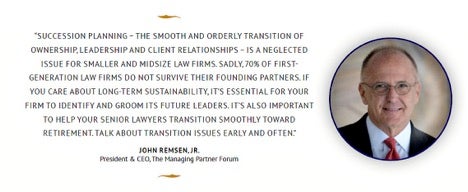What could be more important than securing the future of the law firm? Succession planning is a crucial way to do just that, but it is a process that is largely overlooked. In this fourth installment of the National Law Review’s analysis of the Managing Partner Forum survey, Re-Envisioning the Law Firm, we will look at some of the issues and recommendations stemming from Succession Planning in law firms.
 According to research from the American and Canadian Bar Associations, in 63% of law firms, partners aged 60 or older control at least one-half of law firm revenue. Many law firms have practicing attorneys in their 60s and 70s, and 30-40% of lawyers in private practice are beginning the retirement process. Law firms need to have strategies in place that allow more senior partners to gracefully retire as well as a plan for who will fill their vacancies.
According to research from the American and Canadian Bar Associations, in 63% of law firms, partners aged 60 or older control at least one-half of law firm revenue. Many law firms have practicing attorneys in their 60s and 70s, and 30-40% of lawyers in private practice are beginning the retirement process. Law firms need to have strategies in place that allow more senior partners to gracefully retire as well as a plan for who will fill their vacancies.
Law firms can do much better. Many law firms are not actively thinking about succession planning: according to the MPF survey, “73% of respondents said that their firms were doing only a fair or poor job at identifying and preparing future leaders.” John Remsen[1] says: “Succession planning--the smooth and orderly transition of ownership, leadership and client relationships--is a neglected issue for smaller and midsize law firms. Sadly, 70% of first generation law firms do not survive their founding partners. If you care about long-term sustainability, it’s essential for your firm to identify and room future leaders. It’s also important to help your senior lawyers transition smoothly toward retirement. Talk about transition issues early and often.”
This can be an issue of survival, and an important first step is for law firms to make a plan. Instead of reacting to situations as they come up, law firms need to develop a succession plan that takes into consideration important issues for that law firm. Some things to consider:
- Critical positions (those where sudden vacancies would cause a big problem)
- Potential successors
- Others who might be a good fit for that position in the future
- Training needed to get potential successors ready; if they aren’t there yet

On one end of the spectrum, law firms need to encourage an orderly path to retirement for senior attorneys. Re-Envisioning suggests law firms consider the following steps as ways to encourage attorneys to make plans for retirement, and to encourage an attitude that puts the firm first.
These suggestions are:
- Consider a mandatory de-equitization provision for equity partners 65 years of age
- Implement a Senior Lawyer Transition Plan,
- Abolish organization credit for life.
These steps can help law firms focus on the future. Additionally, making sure important positions--Managing Partners, practice group leaders and large client contacts have a plan in place to train their successors helps assure continuity.
Additionally, thinking more broadly about succession planning within the bigger picture law firm growth is crucial. It’s not just about finding ways to smooth the path into retirement, but also develop new talent within the firm--making sure law firm leadership is actively looking for the next leader or the next rainmaker before it’s necessary. Streamline the process by setting up a list of characteristics or criteria for these positions, and keep conversations open about who would be good where in the future. By taking the time to develop talent before the vacancy appears, law firms can protect themselves from surprise departures and protect the future of the firm.
Alan Becker[2] says, “Every law firm should be developing its future leaders. Identify people with potential; train them (No, Leadership skills are not innate) give them opportunities to grow and excel. It’s never too early to think about and act on succession.”

This is the fourth article in this series. Read earlier articles below:
Time for a Change in Law Firm Leadership: A Preview of Re-Envisioning the Law Firm
Innovation, Change and Accountability: A Way Forward for Law Firm Leadership
Strategic Planning in Law Firms: Essential Steps for Success
[1]Founder of The Remsen Group
[2]Founding Partner and Past Managing Partner of Becker & Poliakoff




 />i
/>i
